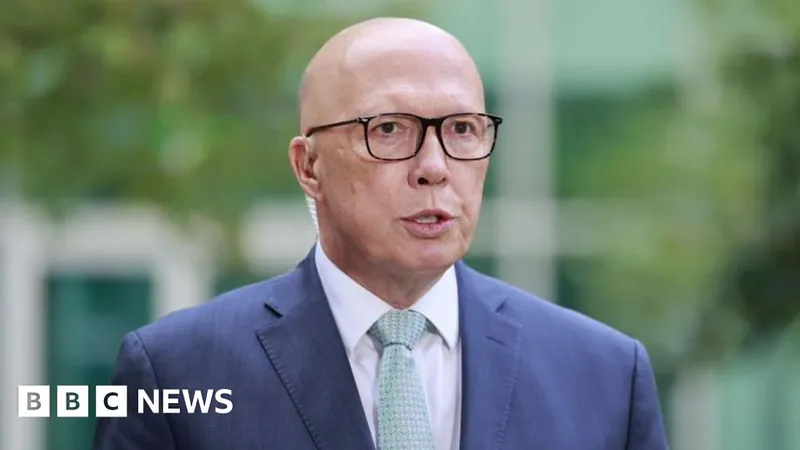
Major Policy Shift: Australia’s Opposition Leader Reverses Course on Work-from-Home Directive
2025-04-07
Author: Lok
In a surprising turn of events, Australia’s opposition leader, Peter Dutton, has announced the abandonment of a controversial election pledge that aimed to eliminate work-from-home options for public servants. This decision comes in response to significant backlash from various sectors of society.
Dutton admitted on Monday that his Liberal-National Coalition made a "mistake" in proposing the policy, which was part of a broader strategy, including plans for substantial job cuts aimed at enhancing public sector efficiency. The election is set for May 3, and the stakes are high for the opposition as they try to regain their footing.
Critics—including members of the ruling Labor government—argued that terminating remote work arrangements would unfairly impact women, who disproportionately benefit from flexible working conditions. "We got it wrong, and we have apologized for it," Dutton stated at a press conference, as he sought to reassure the public about the Coalition’s revised stance.
The Coalition had originally suggested that this policy would focus solely on public servants based in Canberra, yet Dutton accused the Labor Party of conducting what he referred to as a "smear campaign" to misrepresent their intentions. Meanwhile, Shadow Finance Minister Jane Hume emphasized that the Coalition is now committed to maintaining flexible work arrangements, acknowledging their importance in maximizing workforce productivity: "We have listened and understand that flexible work, including work from home, is part of getting the best out of any workforce."
In conjunction with this policy reversal, the Coalition has had to clarify its previously announced intent to reduce the public service workforce by 41,000 positions as a measure to finance other policy initiatives. Critics have long pressed the party for specifics on which departments would be affected. Initial suggestions hinted that forced redundancies might be necessary, but Hume contradicted those claims on Monday, stating that their approach would involve attrition and a hiring freeze to achieve their goals over a five-year period.
This clarification came amid Dutton's earlier remarks which suggested a lack of consensus within the party regarding the implications of the proposed job cuts. Dutton admitted, "We got the policy wrong in that regard, and we've made it clear, now, our position."
The Labor government was quick to capitalize on the inconsistency, with Employment Minister Murray Watt using the moment to critique Dutton’s leadership and credibility. "This just shows Peter Dutton is all over the shop… He can change what he says, but he can't change who he is," Watt conveyed during an interview with the Australian Broadcasting Corporation.
The debate on work-from-home policies is not limited to Australia. Globally, leaders in both government and industry continue to wrestle with the issue of workplace flexibility. For instance, on his first day back in office, former U.S. President Donald Trump mandated that government employees return to the office full-time. Amazon has also joined this movement, requiring its workforce to be physically present in the office.
However, the work-from-home initiative resonated strongly with the Australian public, particularly as rising cost-of-living concerns take precedence. Polling data indicates that voters are increasingly prioritizing workplace flexibility, reflecting a growing trend toward remote work options that have become ingrained in modern employment practices.
As the election approaches, the ramifications of these policy changes will likely play a pivotal role in shaping the future of the Liberal-National Coalition and could be a decisive factor in the upcoming vote. Stay tuned for more updates as this story unfolds!


 Brasil (PT)
Brasil (PT)
 Canada (EN)
Canada (EN)
 Chile (ES)
Chile (ES)
 Česko (CS)
Česko (CS)
 대한민국 (KO)
대한민국 (KO)
 España (ES)
España (ES)
 France (FR)
France (FR)
 Hong Kong (EN)
Hong Kong (EN)
 Italia (IT)
Italia (IT)
 日本 (JA)
日本 (JA)
 Magyarország (HU)
Magyarország (HU)
 Norge (NO)
Norge (NO)
 Polska (PL)
Polska (PL)
 Schweiz (DE)
Schweiz (DE)
 Singapore (EN)
Singapore (EN)
 Sverige (SV)
Sverige (SV)
 Suomi (FI)
Suomi (FI)
 Türkiye (TR)
Türkiye (TR)
 الإمارات العربية المتحدة (AR)
الإمارات العربية المتحدة (AR)